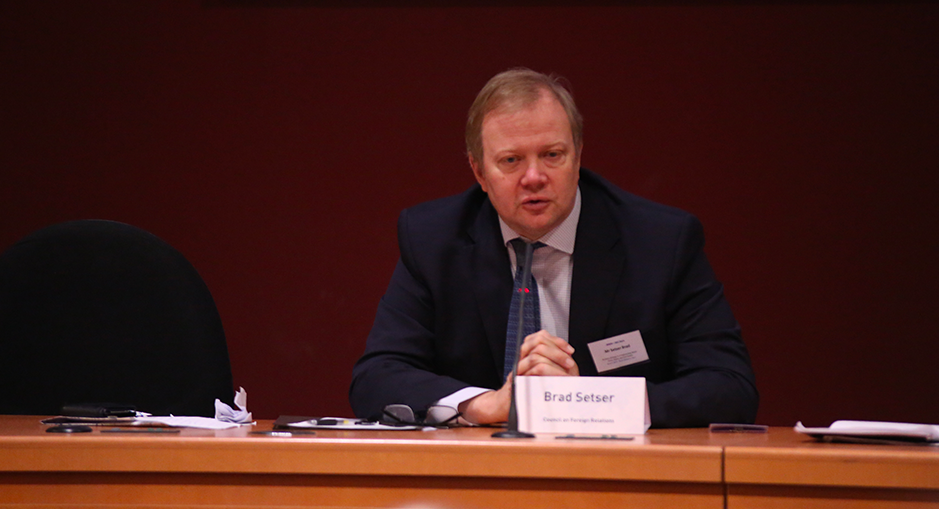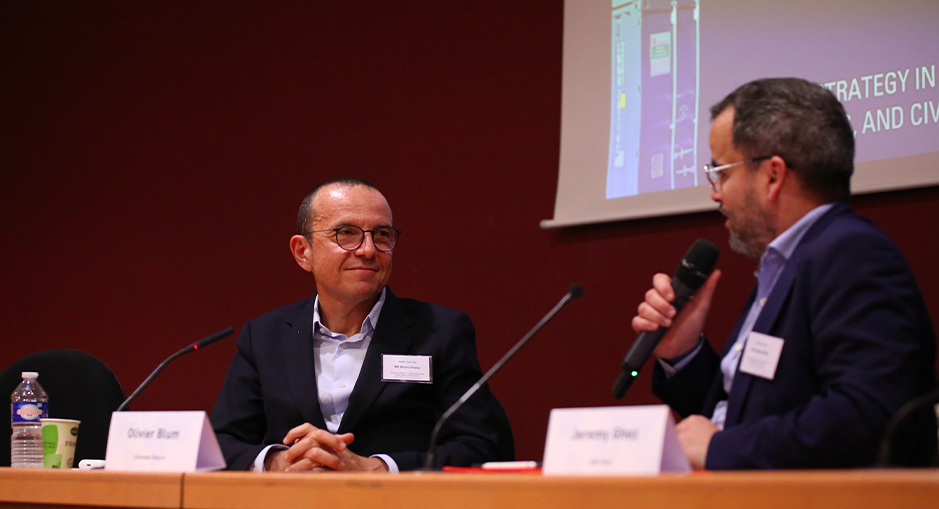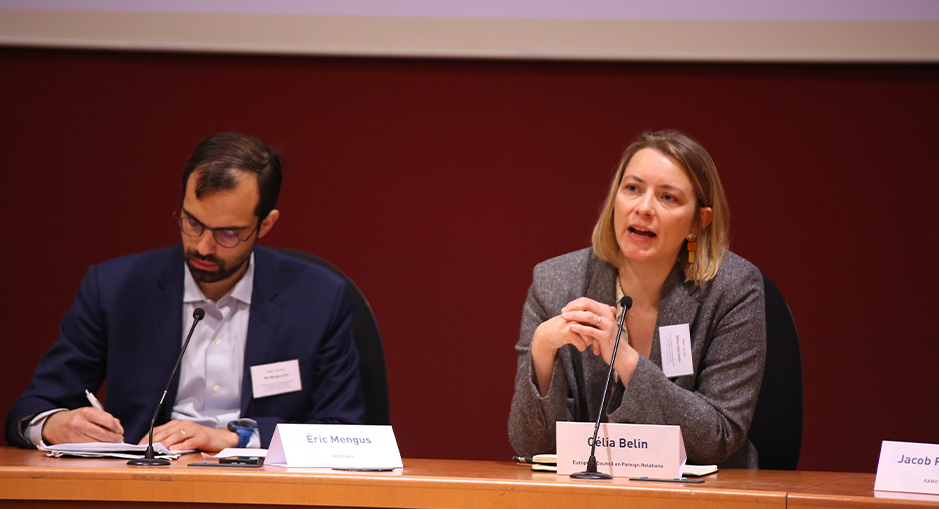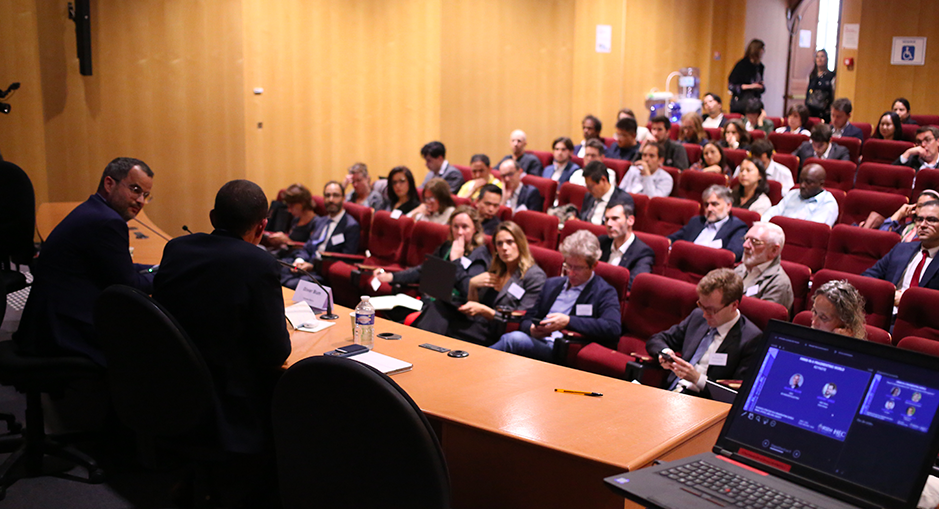Strategy in an Age of Fragmentation
As geopolitics, civil unrest, and technology reshape global strategy, HEC Paris and IRSEM convened a timely dialogue on how firms, states, and civil society must adapt.

© Daniel Brown
Key Takeaways
- Strategy is no longer about optimization - it’s about legitimacy. Leaders must balance local coherence with global ambition in an era of diverging political norms.
- The global economy is shifting from volatility to deep uncertainty. Supply chains, AI governance, and tax policy are now shaped more by politics than efficiency.
- Fragmentation is not episodic - it’s systemic. From trade regulation to tech standards, today's firms face an unstable patchwork of rules, risks, and responsibilities.
- AI is not neutral. It has become an essential sovereign infrastructure, embedding national values and regulatory models in its code and deployment.
- New leadership skills are needed. Strategic coherence beyond business, interdisciplinary fluency, and normative awareness are fast becoming essential C-suite competencies.
Conference Challenges Foundations of Global Business
On June 2, 2025, HEC Paris and IRSEM (the French Ministry of Armed Forces’ strategic research institute) co-hosted a groundbreaking conference in central Paris, titled “Business Strategy in a Fragmenting World: Firms, States, and Civil Society”. It brought together a remarkable lineup of economists, corporate executives, geopolitical analysts, and policymakers to address a defining challenge of our time: how should global firms operate in a world breaking apart along political, technological, and moral lines?
Throughout the day, the co-organizers Jeremy Ghez and Olivier Chatain steered conversations toward one unifying question: what frameworks can firms adopt to navigate this fractured world? The HEC Paris professors helped map the contours of a world in which business, governance, and technology are entangled in a crisis of coherence.
The day unfolded like a geopolitical drama: supply chains turned strategic; AI debated as a weapon and a public good, corporate legitimacy reframed as a societal compact. Underpinning it all was the quiet realization that globalization’s golden age had ended - not with a bang, but with five panels and a series of increasingly urgent reflections.
From Volatility to Uncertainty: The End of Predictable Strategy
The conference began with Eric Mengus, a professor of Economics at HEC Paris, distinguishing volatility - manageable, measurable - from uncertainty, which resists modeling altogether. Fragmentation, he argued, is no longer episodic. It’s systemic. Trade rules shift mid-negotiation. Supply chains adapt not just to market logic but to civic outrage and political embargo. For firms, the new risk isn’t disruption - it’s disorientation.
This sentiment found reinforcement in the remarks of Brad Setser, former U.S. Treasury official and senior fellow at the Council on Foreign Relations. Setser divided his presentation into two parts which, he admitted could appear to contradict each other on the surface. He began by highlighting how resilient the global economy has been, and how difficult it has been to fragment. He insisted that most forecasts made four or eight years ago when Donald Trump was first elected president haven't come true in the economic sphere. And yet, as Setser said in the second part of his talk, the past may not be all that accurate a guide to the future. This is because unlike Trump’s actions in his first term, there is a real possibility that his policies will fragment the Sino-American relationship and the transatlantic relationship. “So,” Setser concluded, “fragmentation is not a reality, but it is my forecast.”
After his intervention, Setser confided to HEC Paris that he hoped future conferences of this quality would address the sensitive topic of tax avoidance by the world’s richest companies. Business strategy, he noted, has operated too long on the assumption that integration equaled stability. Yet the most durable forms of integration - particularly multinational tax avoidance - have thrived by exploiting policy gaps. “Persistence,” he noted dryly, “is not proof of health.” And he warned that, unless Western economies repair the structural weaknesses in international taxation, they risk sparking a regulatory cold war over corporate legitimacy - with firms caught in the crossfire.
Power, Sovereignty, and the Strategic Role of Firms
After the academic speakers set the analytical stage, the keynote conversation between Olivier Blum - Chief Executive Officer of Schneider Electric – and HEC professor Jeremy Ghez offered a powerful insight into the corporate response. Blum spoke not only as a veteran practitioner, but as a realist. In today’s fractured world, he insisted, strategy is no longer about growth or optimization. It’s about legitimacy. That, he insisted, means aligning with local expectations, building trust across diverging systems, and internalizing complexity rather than avoiding it.
For multinational firms, especially in regulated sectors, Blum continued, this marks a profound shift. The playbook once built on economies of scale must now make room for divergent legal regimes, civic expectations, and sovereign tech ecosystems. Global strategy has become multi-local.
It was a theme echoed later in an AI-focused panel titled “Convergence or Divergence?” featuring Vincent Rapp, Executive Director of Hi! PARIS. Alongside policy experts from RAND Europe, EUISS, and OpenAI, Rapp argued that artificial intelligence isn’t merely a tool. It’s infrastructure - layered, politicized, and increasingly sovereign. Who controls data centers, chip manufacturing, or cloud platforms matters as much as the algorithms themselves.
European efforts, Rapp noted, have pivoted toward asserting autonomy across this stack - from raw materials to models. But the challenge is steep: dependencies on U.S. cloud providers and lagging scale-up capacities hamper European aspirations. Yet, in Rapp’s view, France has advantages: strong research, relatively clean energy, and growing investment in AI clusters, such as the one anchored by Hi! PARIS, recently awarded €70 million in public funds for research.
The Anatomy of Fragmentation: Five Lenses
Throughout the day, the five panels dissected the implications of fragmentation from distinct angles. In this way, the panelists moved beyond diagnosis toward redefinition. Rather than present “shopping lists” of challenges, each session traced how fragmentation reconfigures the architecture of decision-making:
- Geo-economic strategy: the speakers warned that pricing fragmentation into markets isn’t enough; firms must integrate it into risk frameworks. The political economy of supply chains is shifting from efficiency to resilience. This follows the paralysis of the WTO’s dispute settlement system, leading to a significant increase in bilateral trade disputes.
- Legal and regulatory frameworks: As Célia Belin noted, companies operating on both sides of the Atlantic increasingly face binary legal imperatives. As the senior policy fellow at the European Council on Foreign Relations, ECFR, she pointed to the tensions caused by the U.S. contracting codes that frown on DEI vs. French mandates that require it. Conflicts between national laws create impossible compliance binds for firms operating transatlantically, she said.
- AI and digital infrastructure: Clotilde Bômont (European Union Institute for Security Studies) provided a sweeping overview of the AI “tech stack,” from critical minerals to semiconductors to data sovereignty. The implication: digital dependencies are now strategic liabilities.
- Supply chain resilience: What began as a pandemic-driven concern is now permanent strategy. For Susan Helper (Case Western), it is possible to reimagine industrial policy to serve both resilience and social equity. At the same time, the analysis presented by Ludovic Subran (Allianz) underlined that fragmentation is now being priced into markets - but not into corporate risk models. Other panelists noted that the need for redundancy, regionalization, and environmental risk management is no longer optional.
Corporate governance: Boards and C-suites must rethink what constitutes fiduciary responsibility. It’s no longer just about shareholders - but about navigating normative legitimacy in pluralistic, contested environments. Yet, for Isabelle Méjean (Sciences Po), tariffs should not be used as catch-all tools since, she noted, civil externalities cannot be solved with a single economic instrument.”
Each of these themes reinforced the central point: fragmentation is not an external event. It is an operating condition.
The Roles of Firms and Civil Society
At the intersection of these lenses lies a deeper organizational challenge: how to maintain coherence and purpose within the firm when political and societal demands tug in different directions. This was underlined by Patrice Kefalas, Corporate VP of Innovation and Partnership at Michelin, who noted that “alignment” has become one of the hardest currencies of corporate strategy - not just across geographies, but within teams. With stakeholders expecting companies to be geopolitical actors, corporate cohesion is tested like never before.
This point resonated with Emlyn Kefengold, head of the Paris bureau at Alderman, who underscored that companies are increasingly looked up to - not just for service delivery or innovation, but as moral compasses and guarantors of legitimacy. “In a world of institutional mistrust, firms are seen as more competent than governments,” she warned. That reverence, however, is fragile: it comes with the burden of responsibility and a higher cost of failure.
Ronnie Chatterji, Chief Economist at OpenAI and former White House official, brought a constructive perspective. In an era when diplomacy stumbles, he noted, conferences like this one may act as “epistemic bridges”. These knowledge builders could help stave off complete fragmentation by creating shared baselines across sectors. “We need these spaces of trust,” he said, “if we want AI and deep tech to be governed responsibly.”
And as financial strategist Alexandre Gaillard of Jolt Capital emphasized, the current model of economic fragmentation is inefficient not only for trade, but for innovation. Fragmentation creates duplication, raises costs, and constrains knowledge flows. If left unchecked, it could slow the green transition, dilute global public goods, and exacerbate tensions between major powers.
Finally, civil society’s agenda is far from neutral. Fabienne Hara of the Paris Peace Forum and Maaike Okano-Heijmans of the Clingendael Institute warned against viewing NGOs and civic actors as mere “buffers” in geopolitical frictions. Civil society, they argued, is a force in itself - with its own values, its own diplomatic capacity, and its own demands. Its inclusion is not a box-ticking exercise, but a strategic imperative.
Benjamin Nefussi, from France’s Ministry of the Economy and Finance, echoed this in practical terms: “Industrial policy is no longer about picking winners. It’s about stress-testing the system.” Civil society, for all its dissonance, may be one of the most effective stress tests firms have.
The New Mandate: Strategic Coherence
By late afternoon, the room had shifted from diagnosis to reconstruction. If fragmentation is here to stay, what kind of leadership does it demand? Susan Helper, former chief economist at the U.S. Department of Commerce, called for a redefinition of industrial policy - one that balances resilience with social equity. ECFR’s Belin spoke to the contradictions companies face as geopolitical values increasingly shape market access.
Perhaps the most pressing takeaway came from the conference’s co-organizers, Jeremy Ghez and Olivier Chatain of HEC Paris. Their closing remarks didn’t offer simple prescriptions. Instead, they urged a mindset shift: from managing complexity to owning it. That means equipping future leaders with interdisciplinary fluency, geopolitical intelligence, and the humility to know that neutrality is no longer neutral. These are clear markers for the teaching curricula at business schools like HEC Paris.
What Comes Next?
The École Militaire conference felt very much like a prototype of how institutions like HEC Paris and IRSEM can convene actors across sectors to reimagine strategy under stress. In a world where AI models challenge diplomatic norms, supply chains double as national security levers, and corporate behavior is scrutinized for civic coherence, the conference speakers underlined how the firm is no longer a passive actor. It is a geopolitical node.
The message was clear: strategy, once about optimization, is now about navigation. And in this age of fragmentation, survival may depend not on predicting the future - but on cultivating the reflexes, partnerships, and values that can hold amid the storm.



